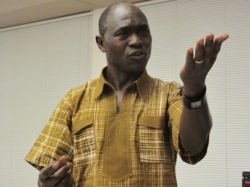CRS official shares experience with Charities’ Young Professionals group
SOUTH BOSTON -- A recent talk on poverty in Africa is helping to revive a local group of young professionals dedicated to ending poverty in the Boston area and around the world.
On Feb. 3 at the Laboure Center in South Boston, YoPros, the young professionals group of Catholic Charities Archdiocese of Boston, hosted a discussion with Thomas Awiapo, a native and resident of Ghana, for a discussion on poverty in the African country and the impact Catholic Relief Services has had there. YoPros hosted the event with CRS.
YoPros, which was formed 15 years ago, has enjoyed a resurgence after a brief hiatus. The group brings together young professionals in the Boston area ages 21 to 43, to support the anti-poverty programs of Catholic Charities through social networking, service, and anti-poverty advocacy, says Catholic Charities development officer Annie Schreiber.
Events like the recent discussion in South Boston help the group fulfill its mission, she said.
In the talk, Awiapo shared his experiences growing up in poverty, and how he had come to realize the value of education in his life.
Awiapo, who told The Pilot after the event that he does not know his age because of a lack of precise records, remembers losing both his parents at a young age. Food was scarce for the family, and he told the audience of about 100 people that he and his siblings often fought for food. Later, he watched some of his siblings die from malnutrition. One brother abandoned the village roughly 30 years ago, and Awiapo has not seen him since.
He lived in a mud hut with no electricity or running water. He said he did not even know electricity existed growing up. The only light he saw growing up, other than natural light, was a kerosene lamp that his family lit only a few times.
During the first part of the talk, he recalled his first encounters with amenities like electricity and running water. While at an American airport, he remembered sticking his hand under the faucets that dispensed water automatically.
“I just stayed in that bathroom and I was like ‘hot, cold, hot, cold,’” he said. “The only water I had access to was water from a river. I had to walk miles to get to that river.”
He also said that the water was germ-infested.
When he was sick, Awiapo remembered his parents gathering herbs from the African wilderness and boiling them with water into a drink he said tasted “very bitter.”
He also said that he cleaned his teeth by chewing on a twig.
Awiapo devoted a significant portion of his talk to the impact that education had on his life.
When CRS came to his village, the organization built a school. Originally, Awiapo said, he hated school, but only went because a free snack and a hot lunch was offered as an incentive to attend. He admitted that he would often ponder how to grab the snack and make a quick exit from school.
Today, Awiapo, who works for CRS coordinating relief visits from outside delegations, holds a master’s degree in public relief administration. He is the father of four children, three of whom are school-age and in school.
“Imagine the power of that little snack to a hungry child in a village,” he said. “That little snack meant everything at the time.”
At first, he did not perform well in school, sometimes finishing last on final examinations. He recalled that as teachers read the results aloud, students would boo those who finished last in the class. Conversely, they also applauded those who finished at the top of the class.
Awiapo said that after hearing numerous boos, he became more motivated. He also credits his teachers for working with him to achieve academic success.
Students applauded him the first time he finished tenth in an exam, he said.
“That’s when I decided to change my attitude,” Awiapo said.
“Education is liberation,” he said. “Education is the only tool that can bring down the chains of poverty and misery. Education is empowerment.”
Chris Abell, 23, a YoPros member, said that education can combat hunger in today’s world.
“I think we should look at preventive measures instead of just treating it because if we prevent it in the first place we won’t have to cure it,” he said.
Sue Cocchiarella, a social worker at Boston Medical Center, has patients who are poor, many of whom did not finish high school.
“A lot of it has to do with the education level,” she said. “They stay in a rut.”
In the last few months, the group has hosted numerous events for young professionals, from those fresh out of college to those who were born just after the Baby Boom years, to network, serve the community, and work to end poverty at the same time.
“We’ve rebranded it,” said Annie Schreiber, a Catholic Charities development officer. “It was dormant for a year and a half.”
On Dec. 17, 2009, the group held Friends Feeding Families, a brown bag food party that raised $570 in grocery store gift cards and seven bags of food for local families in need. Items raised went to Catholic Charities food pantries in the region.
“I consider that a success right before Christmas,” Schreiber said.
YoPros also hosted, along with Catholic Charities North, an event to benefit relief for Boston’s Haitian community in Salem on Feb. 10.
“YoPros is all about building relationships,” Schreiber said. “It’s providing an atmosphere where people can build that sort of community.”



















